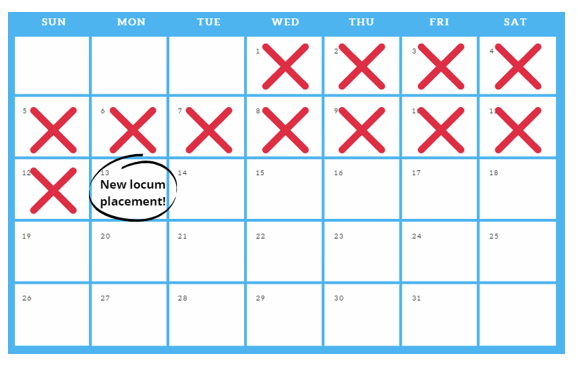A health crisis, even those smaller than one of pandemic proportions, is a challenging occasion for any health worker. With the immense pressure to support the foundation of health in the community, many often forget to look after themselves. The ability to de-stress on a day off often feels so far away, and occasionally it can be difficult to know the best techniques or diverse ways to de-stress.
Everyone has different ways to de-stress but instead of listing methods that can be applied to everyone, here are some first-hand tips from health care workers themselves:
#1 Learn a Language
Many are probably thinking, how will learning a language help me de-stress? At the very least it will expand your world view and enhance your career opportunities. However, did you know that interactive language apps like Duolingo can help improve mental wellbeing by offering interactive and fun ways for you to distract yourself.
"After promising myself (and my Italian grandparents) for years that I would properly learn Italian, it is finally in play! I use an app called Duolingo (which is amazing!) and practice for half an hour every day before bed. It's really fun, hugely addicting and free, so I would definitely recommend!" –Mia, HCA from Watford*
#2 Chuff Chart
A chuff chart is essential a countdown to something for you to look forward to, and what better way to reassure yourself than with a countdown. There are a variety of ways to approach this, a more modern and easy way is by having a countdown app on your phone. This method will allow you to find motivation and work to a goal when you know you are working to an end of something. It’s easy and a less time-consuming project to reinvigorate yourself and to boost positivity.
"I've recently started using chuff charts again from my time in the RAF to countdown the days of my locum placements. During this time, when everything is out of our control, I find chuff charts great as there is an end in sight. It reminds me of an old saying back in the RAF 'days to do are getting few'." –Stephen, Radiographer from Sussex*

#3 Meditation/Yoga
It is a popular choice for de-stressing and clearing for a healthier mind. Today, there are so many apps, blogs, and books that offer techniques and advice on meditating and mindfulness. A combination of two can benefit not only your mind but may have an impact on your physical health as well by enabling better sleep. Apps like Calm have partnered with the NHS and are offering free access to their website and app to help de-stress after a long shift.
Recommendations from health professionals: Calm app or headspace, reading meditation books or watching YouTube videos that go over certain techniques.
#4 Yoga and Stretching
Yoga has been often touted as a go to destressing exercise, not only does it include aspects of meditation, but it can also help break out of the negative cycle of feeling tense and anxious by prompting focus on the here and now, while also encouraging positivity and affirmation.
There are a variety of different ways to practice yoga and from all levels of experience, you can use an app such as Down Dog, Daily Yoga, Yoga Studio and many more and some of which offer discount to Healthcare Professionals.
You can also learn yoga via YouTube videos such as Yoga with Adriene, many of which offer short videos for those with time constraints.
If yoga can seem a bit intimidating to you, you can always do a variety of stretches to destress. Quite often the body can tense up when under stress, causing muscle ache and fatigue. Taking even just 15 minutes out of your day to gentle stress and care for your body can make a huge difference.
#5 Mantra
Consistently putting others’ health before yours can take a toll. Mantras can be simple as changing “I can’t” to “I can”; there are a variety of mantra books that are great for motivating you to take good care of yourself. Vex King, a popular Instagram blogger wrote the book “Good vibes, Good life: How self-love is the key to unlocking your greatness.”
Recommendations from health professionals: Mantra-Daily Affirmations, reading modern or older versions of mantra books.
#6 Praying
Praying is a universal way of communicating with God; it can offer people comfort and protection in times they feel at stress. Although beliefs can be a sensitive topic to talk about it, is a good way to communicate your stresses. Pray with me is a website that offers a range of prayers for all topics.
Recommendations from health professionals: Pray with me, visiting a holy place, reading religious/spiritual books or attending spiritual groups.
"Praying is my main source of comfort, especially during these times. When coping with the death of patients and dealing with stress and anxiety, I find that praying is my only solution where I feel calm and at ease." –Rachel, Nursing Practitioner from Hertfordshire*
#7 Gardening
A more therapeutic way to de-stress is to take up activities like gardening, gardening can be a good asset to your mental health, especially if it is your own garden or allotment. Not only does it help your mental well-being, but it is a skill that can make you more creative when it comes to decorating your garden and planting vegetables. Research ideas online, talk to your neighbours if you admire their garden or even use your own inspiration.
Recommendations from health professionals: Gardenersworld, visiting home and garden shops, communicating with neighbours and asking for inspiration.
“I enjoy gardening, because it allows me to de-attach myself from work and focus on the excitement of designing my own garden, growing vegetables which is kinder to the earth and makes me feel calm.” –Sarah, HCA from Kent*
#8 Listening to music
Music is what unites us as one. We want to relate to the lyrics and understand meanings that sometimes can be far more complex than how they sound. Music has been completely revolutionized with platforms like YouTube and Spotify offering a wide range of genres of music, and Spotify offer playlists for specific moods which can really help when you just want a distraction.
Recommendations from health professionals: explore different genres of music, use Spotify app as they offer playlists for specific moods, attend music festivals for a more outgoing activity.
#9 Express your feelings / Start a journal
Sometimes when people get stressed it can help to talk about your feelings; it is a very common trait that all humans will do. Whether we talk to our partner, our family, our friends or even another health professional, expressing how we feel can take a lot off our own shoulders. Diary writing is a recommendation that is mentioned enough, some people can find it difficult to express how they feel to another person, so writing it in a diary can help them to express what they feel.
Recommendations from health professionals: log a journal, talking to family and friends, your GP, support groups and talking therapy, your colleagues.
#10 Rhythmic activities
Moving, sliding, jumping along to a beat or a sound can increase your physical performance and your mental functions as it regulates your brain and prevents a decline in your cognitive abilities. Along with the help with music today, many of us love to move along with the beat, it increases our endorphins and can stimulate feelings.
Recommendations from health professionals: join a Zumba class, dance workouts on YouTube, put your headphones in and take a jog/run.
#11 Be Creative
Lastly, creativity! You can be creative whatever way you think works for you. Creativity is diverse, its unique, to everyone. We constantly think of ways that we can do activities and what can help us de-stress; every health professional will embrace their differences when it comes to de-stressing because it can inspire others to try it as well. Cooking and baking, knitting to arts and crafts, pet sitting to dance and cleaning to reading a book. Creativity is all around us, if we try, we can do it!
There’s no doubt that healthcare workers experience high levels of stress and burnout but the most important thing to remember is to take care of yourself. Reading this article is not going to rid you of stress but it is one step closer on your journey to managing it. If one method doesn’t work, that’s okay, try another, because you WILL find what works for you and reap the benefits!
It’s okay to seek help from a professional and there are a number of great organisations out there such as Samaritans and Mind who promote mental wellbeing and offer 24/7 support for anyone in need of support. The NHS have also provided a list of all the charities and support groups for anyone in need of expert advice.
If you urgently need someone to talk to, please contact Samaritans on 116 123.
Taking care of yourself is a number 1 priority. What are your favourite ways to de-stress?
